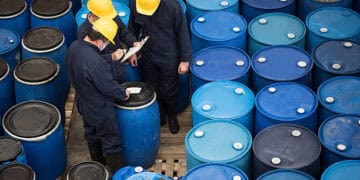A comprehensive study has highlighted the significant impact of anthropogenic chemicals on human health and ecosystems, shedding light on the importance of the Rotterdam Convention. While these chemicals provide essential functionalities and convenience, they have led to adverse effects.
For instance, the study estimates that in 2019 alone, exposure to lead and occupational exposure to certain carcinogens among the vast array of registered chemical substances caused over 1.2 million premature deaths and resulted in a loss of approximately 30 million disability-adjusted life years. This health burden is nearly equivalent to that caused by secondhand smoke. Moreover, chemical pollution has emerged as one of the primary drivers of global biodiversity loss, alongside climate change, presenting a significant planetary crisis.
Many countries and regions have introduced frameworks to manage chemicals within their jurisdictions, but the effectiveness of these approaches is limited. This is because chemicals can easily cross borders through global trade, resource exchange, and environmental factors like wind and water currents. Furthermore, numerous countries have yet to establish their own chemical management frameworks.
To address these challenges, various global treaties, including the Rotterdam Convention, have been established to govern the transboundary movement of hazardous chemicals. The Rotterdam Convention, initiated in 2004 and ratified by the European Union and 164 countries, introduces the “prior informed consent” (PIC) procedure. This procedure is designed not to ban or restrict chemicals but to facilitate informed decision-making by countries regarding imports. Importing and exporting parties are required to ensure compliance with import responses, and it is illegal to export chemicals to parties that have not consented to further imports. The Convention also continuously assesses and adds new chemicals to the PIC procedure.
The study analyzes global trade data of 46 highly hazardous chemicals listed under the Rotterdam Convention from 2004 to 2019, focusing on accuracy and minimizing errors in trade data. It reveals that while some chemicals have shown decreasing trade trends, others, such as ethylene dichloride and TBTs, have exhibited increasing trade volumes. Additionally, the study identifies prevalent illegal trade of hazardous chemicals among parties to the Convention.
The Rotterdam Convention, although beneficial, requires further strengthening and expansion to address ongoing challenges in global chemical trade effectively. Recommendations include inviting more countries to ratify the Convention, imposing stricter supervision on imports and exports, and expediting the listing of chemicals. The study also emphasizes the importance of improving data quality and accessibility for better monitoring of hazardous chemical trade.
In conclusion, the study underscores the need for urgent action to address the global trade of highly hazardous chemicals, particularly illegal trade, to protect human health and the environment. The Rotterdam Convention plays a vital role, but concerted efforts at the global, regional, and national levels are essential to mitigate the risks associated with these chemicals.
Explore top supply chain news stories at The Supply Chain Report. Visit ADAMftd.com for free international trade tools.
#RotterdamConvention #ChemicalManagement #GlobalTrade #EnvironmentalHealth #BiodiversityCrisis #ChemicalPollution #HazardousChemicals #PriorInformedConsent #HealthImpact #EcosystemProtection #LeadExposure #GlobalBiodiversity #IllegalTrade #ChemicalSafety #PICProcedure #SustainableEnvironment #HumanHealthProtection #GlobalCooperation #ChemicalTradeData #StrengthenRegulations #EnvironmentalTreaties #ToxicSubstances
















